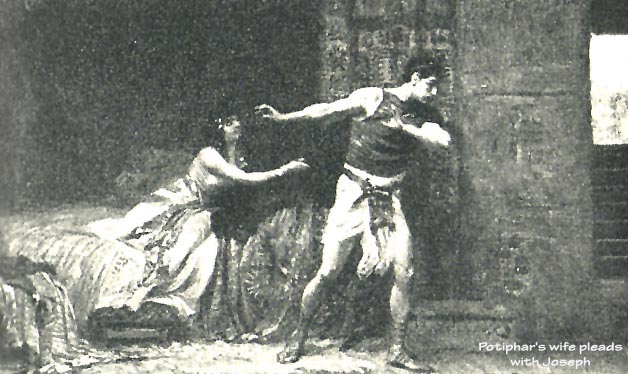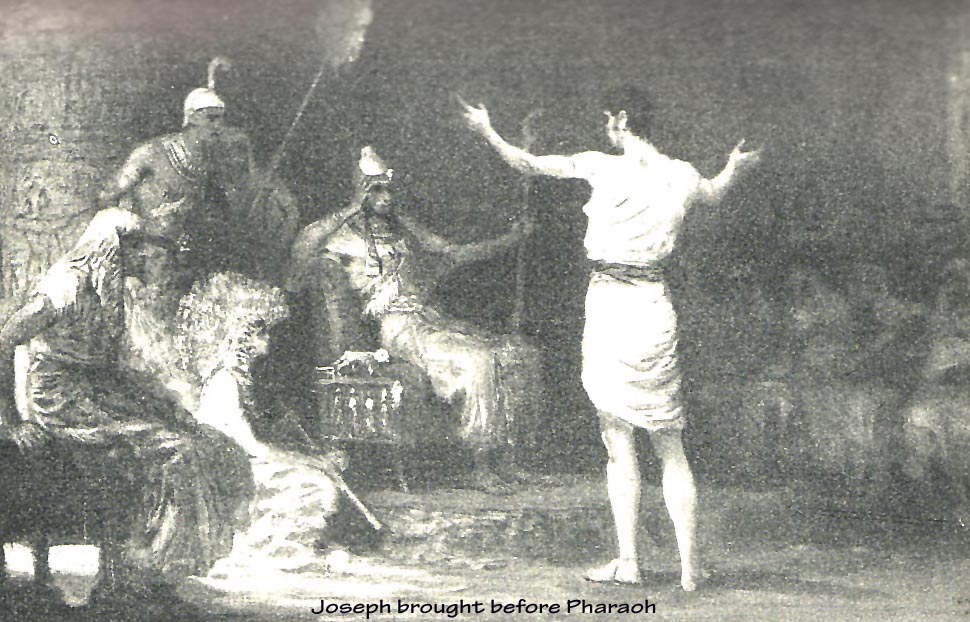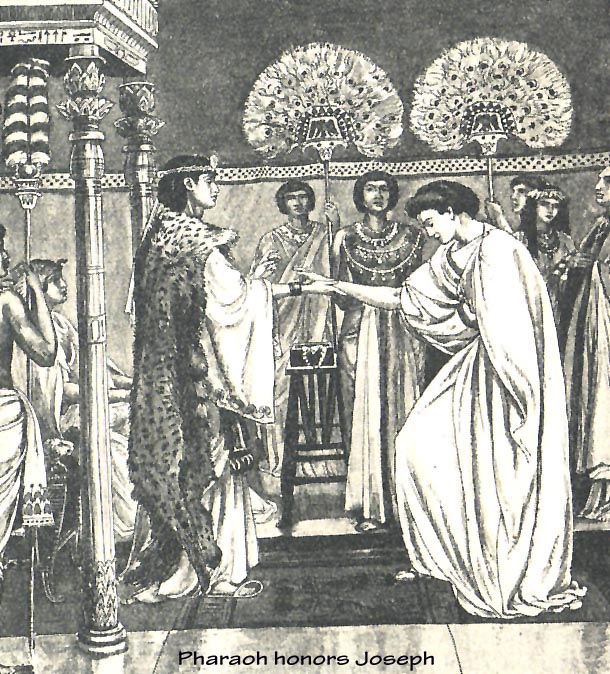
Stories From The Hebrew Bible
FROM THE PRISON TO THE PALACE

Stories From The Hebrew Bible
FROM THE PRISON TO THE PALACE
The men who bought Joseph from his brothers were called Ishmaelites, because they belonged to the family of Ishmael, who, you may remember, was the son of Hagar, the servant of Sarah. These men carried Joseph southward over the plain which lies beside the Great Sea on the west of Canaan. After many days they brought Joseph to Egypt. How strange it all must have seemed to the boy Joseph who had lived in tents. Now he sees the great river Nile; cities thronged with people, and temples and pyramids – so much that he had never seen before!
The Ishmaelities sold Joseph as a slave to a man named Potiphar, who was an officer in the army of Pharaoh, the king of Egypt. Joseph was a nice looking boy, cheerful and willing in spirit, and good in all he undertook. So much so that his master, Potiphar, became very friendly with him, and after a time he placed Joseph in charge of his house and everything in it. For some years Joseph continued in the house of Potiphar. He was a slave in name, but in reality the master of his own affairs and ruler over other servants.
But Potiphar’s wife, who at first was very friendly to Joseph, afterward became his enemy, because Joseph would not do wrong to please her. She told her husband that Joseph had done a wicked deed. Her husband believed her, and was very angry at Joseph. He put him in prison with those who had broken the law. How hard it must have been for Joseph to be charged with such a crime. He had done no wrong, yet he was thrust into a prison among wicked people!

But God was with Joseph and took care of him. The keeper or chief jailer of the prison was kind to Joseph and placed him in charge of all the prisoners. In fact, the chief jailer paid no attention to anything under Joseph’s care. In other words, Joseph took care of everything, just as he had done in Potiphar’s house. The keeper of the prison had confidence in Joseph and left the prison to him, trusting that Joseph would be faithful and wise in doing the work given to him. Joseph did right and served God; and God blessed Joseph in everything.
While Joseph was in the prison, the king of Egypt sent two men there because he was displeased with them. One was the king’s chief butler; the other was the chief baker. These two men were under Joseph’s care.
One morning, when Joseph came into the prison room where the butler and the baker were kept, he found them looking sad. Joseph said to them: “Why do you look so sad today?” Joseph was cheerful and happy in his spirit and he wanted others to be happy, even in prison.
And one of the men said, “Each one of us dreamed last night a very strange dream; and there is no one to tell us what our dreams mean.”
In the time of Joseph, before God gave us the Bible, He often spoke to people in dreams; and there were wise men, who could sometimes tell what the dreams meant.
“Tell me,” said Joseph, “What your dreams were. Perhaps my God will help me to understand them.”
Then the chief butler told his dream. He said,
In my dream I saw a grapevine with three branches; and as I looked, the branches shot out buds, and the buds became blossoms, and the blossoms turned into clusters of ripe grapes. And I picked the grapes and squeezed their juice into King Pharaoh’s cup, and it became wine; and I gave it to King Pharaoh to drink, just as I used to do when I was beside his table.
Then Joseph said,
This is what your dream means. The three branches mean three days. In three days King Pharaoh will call you out of prison, and will put you back in your place; and you shall stand at his table, and shall give him his wine, as you have given it before. But when you go out of prison, please remember me, and try to find some way to get me, too, out of prison. For I was stolen out of the land of Canaan and sold as a slave; and I have done nothing to deserve being put in this prison. Do speak to the king for me, that I may be set free.
Of course the chief butler felt very happy to hear that his dream had such a pleasant meaning; and then the chief baker spoke, hoping to have an answer as good.
“In my dream,” said the baker, “there were three baskets of baked goods on my head, one above the other, and in the top most basket were all kinds of baked food for Pharaoh; and the birds came and ate the food on my head.”
Then Joseph said to the baker:
This is the meaning of your dream, and I am sorry to tell it to you. The three baskets are three days. In three days, by order of the king, you shall be lifted up and hanged upon a tree; and the birds shall eat your flesh from your bones as you are hanging in the air.
And it came to pass, just as Joseph had said. Three days after that, King Pharaoh sent his officers to the prison. They came and took out both the chief butler and the chief baker. The baker was hung by his neck to die and his body left for the birds to pick in pieces. The chief butler was taken back to his old place, where he waited at the king’s table and handed him wine to drink.
You would think that the butler would remember Joseph. After all, Joseph had given him the promise of freedom, and had shown great wisdom. But in his gladness, the butler forgot all about Joseph. Two full years passed by and Joseph was still in prison; now a man of thirty years old.
But one night, King Pharaoh himself dreamed a dream, in fact two dreams in one. And in the morning he sent for all the wise men of Egypt and told them his dreams. But no one knew the meaning of them. The king was troubled. He felt the dreams were important and had meanings that he should know.
Then suddenly the king’s chief butler remembered his own dream in the prison two years before, and remembered, too, the young man who had told its meaning. And he said:
I do remember my faults this day. Two years ago King Pharaoh was angry with his servants, with me and the chief baker, and he sent us to the prison. While we were in the prison, one night each of us dreamed a dream, and the next day a young man in the prison, a Hebrew from the land of Canaan, told us what our dreams meant; and in three days they came true, just as the Hebrew had said. I think that if this young man is still in the prison, he could tell the king the meaning of his dreams.
Notice that the butler spoke of Joseph as “a Hebrew.” The people of Israel, to whom Joseph belonged, were called Hebrews as well as Israelites. The word Hebrew means “one who crossed over,” and was given to the Israelites because their father Abraham had come from a land on the other side of the river Euphrates, and had crossed over the river on his way to Canaan.
King Pharaoh quickly sent for Joseph; and he was taken out of prison, dressed in new garments and led to Pharaoh. Then Pharaoh said to Joseph,
I have dreamed a dream, and there is no one who can tell what it means. And I have been told that you have power to understand dreams and what they mean.
And Joseph answered Pharaoh, “The power is not in me; but God will give Pharaoh a good answer. What is the dream that the king has dreamed?”
“In my first dream,” said Pharaoh,
I was standing by the river; and I saw seven fat and handsome cows come up from the river to feed in the grass. And while they were feeding, seven other cows followed them up from the river, very thin and poor and lean, such miserable creatures as I had never seen. And the seven lean cows ate up the seven fat cows; and after they had eaten them, they were as lean and miserable as before. Then I awoke.
And I fell asleep again and dreamed again. In my second dream, I saw seven heads of grain growing on one stalk, large and strong and good. And then seven thin and poor and withered heads came up after them. And the seven thin heads swallowed up the seven good heads, and afterward were as poor and withered as before.
And I told these two dreams to all the wise men, and there is no one who can tell me their meaning. Can you tell me what these dreams mean?
And Joseph said to the king:
The two dreams have the same meaning. God has been showing to King Pharaoh what He will do in this land. The seven good cows mean seven years, and the seven good heads of grain mean the same seven years. The seven lean cows and the seven thin heads of grain also mean seven years. The good cows and the good grain mean seven years of plenty; and the seven thin cows and thin heads of grain mean seven poor years. Coming upon the land of Egypt are seven years of such plenty as have never been seen; when the fields shall bring greater crops than ever before; and after those years shall come seven years when the fields shall bring no crops at all. And then for seven years there shall be such need, that the years of plenty will be forgotten, for the people will have nothing to eat.
Now, let King Pharaoh find some man who is able and wise, and let him set this man to rule over the land. And during the seven years of plenty, let a part of the crops be put away for the years of need. If this shall be done, then when the years of need come there will be plenty of food for all the people and no one will suffer, for all will have enough.

And King Pharaoh said to Joseph: “Since God has shown you all this, there is no other man as wise as you. I will appoint you to do this work and to rule over the land of Egypt. All the people shall be under you; only on the throne of Egypt, I will be above you.”
And Pharaoh took from his own hand the ring which held his seal, and put it on Joseph’s hand, so that he could sign for the king and seal in the king’s place. And he dressed Joseph in robes of fine linen, and put around his neck a gold chain. And he made Joseph ride in a chariot which was next in rank to his own. And they cried out before Joseph, “Bow the knee.” And thus Joseph was ruler over all the land of Egypt.

So the slave boy, who was sent to prison without deserving it, came out of prison to be a prince and a master over all the land. Isn’t it wonderful that our heavenly Father never forgets? He never forgot Joseph, even though sometimes it seemed that He had left him to suffer.